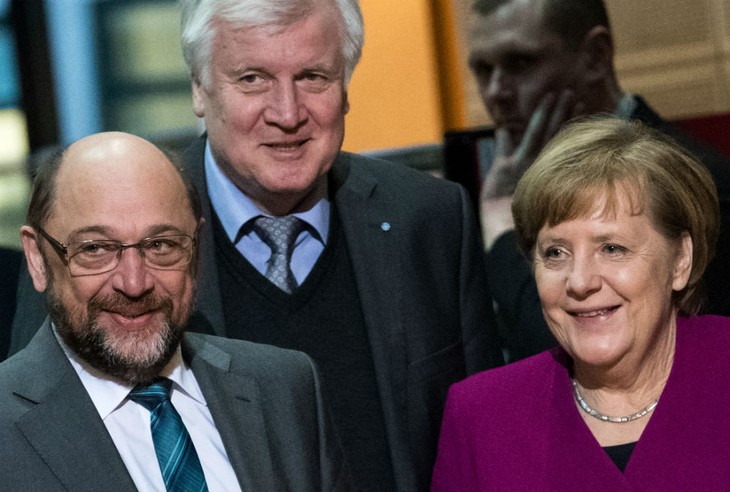(VOVWORLD) -The final talks on German’s new coalition government are taking longer than expected. Negotiations have progressed but there remain some unresolved impediments to a final agreement. The extended negotiations are to resolve a political standoff that has existed since the federal election last September.
 SPD leader Martin Schulz (l), CSU head Horst Seehofer and Chancellor Angela Merkel (r). (Photo: DPA) SPD leader Martin Schulz (l), CSU head Horst Seehofer and Chancellor Angela Merkel (r). (Photo: DPA)
|
German Chancellor Angela Merkel's CDU/CSU coalition is negotiating with the Social Democrats (SPD) to form a new government.
Remarkable progresses
The CDU/CSU and SPD have gone through some tough negotiations and have made considerable progress. With goodwill from both sides, they have agreed on issues of climate change response, retirement allowance, and family reunification for migrants.
Both sides have also agreed to reserve a Eurozone budget, end Germany’s austerity policy, and seek fairer corporate taxation for American tech giants in Europe, including Google, Apple, Facebook and Amazon. The agreements were reached without any specific numbers, but they reflect a shared conviction that a strong coalition government in Germany is essential to a strong and united Europe.
Obstacles
The toughest pending issues are labor and healthcare. The SPD wants to tighten restrictions on companies that use short-term labor contracts to avoid paying insurance and social security taxes, so that when an initial labor contract expires, the employer must sign a long term contract with the employee. This plan was rejected by the CDU/CSU, which wants regulations that prevent companies from extending too many short term contracts. The conservative CDU/CSU has flatly rejected SPD’s calls to introduce sweeping changes to Germany’s health insurance system which would replace the current multi-payer health care system with a national single-payer model.
SPD’s return to coalition talks has caused an internal split within the SPD. Its tough stance on these two issues is a bid to strengthen unity among its members.
Germany is still waiting for a stable coalition government months after the September 24 election. This has slowed economic development as well as the EU’s ambitious reform plan.